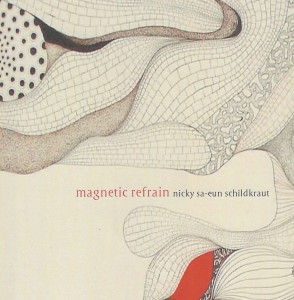Magnetic Refrain by Nicky Sa-eun Schildkraut | Kaya Press 2013 | $14.95
. . . Conjoined at the hip, we could
only pretend to be aligned but really
were so frantic to separate. You tried
to saw us in half, after I’d fallen asleep,
then I’d woken to what you’d done,
brilliantly. You’d bandaged the sopping
blood at the split bone and medicated me,
but still, I was pleased by our most recent
attempt at sovereignty. I could not
complain for lack of dishonesty.
It has never been that easy, keeping you
secret, when you keep dividing me.(from “Dear Other,” series)

In Magnetic Refrain, transnational Korean American adoptee Nicky Sa-eun Schildkraut speaks through folktales and fox-demons, inflatable dolls and war brides, defectors seeking asylum and mothers separated from their children by adoption and military partition, to explore the magnetism of twinning, the conjunction of self and other, and the continued return to the loss of never knowing.
Like the poems “The Unfilial Daughter” and “The Filial Son,” or “Venus and the Martian,” many pieces and personas in this collection mirror each other in their adjacency, like twins. The tension becomes a metaphor for the diasporic longing to come together, cross the water, and belong within a family history that straddles endless divisions.
As an adoptee with two birth dates and two different names, Schildkraut writes of the phantom parallel trajectory of a life that could have been lived, a loss that begins to haunt. Two sets of parents. Mother and other, “multiplying instead of living” (“The Lucky Bastard”). Schildkraut gestures toward a fantasy of joining these two trajectories, a fantasy in which one becomes two becomes one, becomes same.
Twins, siblings and lovers recur, wanting the m/other, “[taking] turns becoming invisible” and then “long[ing] to become visible, again” (“Family History”), “pulling her in half” (“The Twin She Never Knew”). The “magnetic refrain” of the book contemplates what holds two people together—a child to its family—and whether or not these magnetisms could be classified as “love.”
Schildkraut’s collection features many poems in the second person, but the point of view shifts in the final piece, “Vaguely Asian,” where the weight of her explorations via folklore and human/doll hybrids settles into a more personal narrative. Here, Schildkraut’s sharp voice struggles with the diasporic plight of not knowing, and what it means to be given up “out of love, for strangers in a foreign country” (“Oedipal”). Looking at an old scrapbook, she writes, “The pages for early memories from birth to early childhood, date and time of birth, are all left blank.” Visiting a Korean shaman, she asks herself, “What can she tell me about my other, early life in Korea that hasn’t already been made up out of thin air?”
“It’s a different kind of loss, to never know,” realizes Schildkraut. Her poems and personas literally and figuratively become inflated by longing. She ends “Vaguely Asian” with the following revelation regarding origin and place: “And even if those origins are obscured, the drive to search still remains like a lantern sending a fractured pattern of shapes against the wall at dusk, half-shadows, half-light.” These poems breathe into the shell of diasporic desire, and allow us to witness the speaker’s first flickering attempts toward animation and fullness.
* * *
Magnetic Refrain will be published by Kaya Press on February 4, 2013.
3 thoughts on “Review: Nicky Sa-eun Schildkraut’s MAGNETIC REFRAIN”